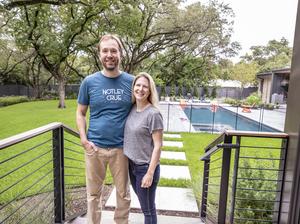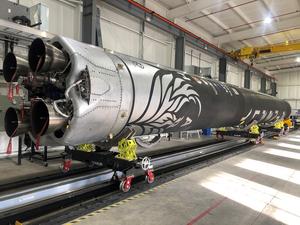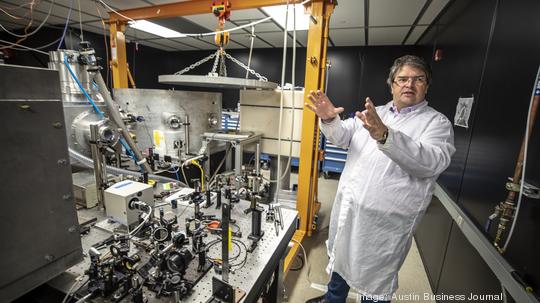
What starts as an imperceptible flash of laser light bounces off mirrors and lenses and divides into different spectrums before rejoining as a fantastically charged disk of light that then rips through a cloud of helium and becomes plasma, helping expose the tiniest of interactions between particles with clarity and focus unlike nearly anything humans have seen before.
These interactions, inside a lab at the University of Texas, are measured in femtoseconds – quadrillionths of a second.
At one point, as the laser light is channeled through the system, it has about a joule of energy, which is not a lot of energy. But with a tiny pulse, 30-40 femtoseconds, its peak power reaches 50 terawatts, which is about 50 times the total electric grid power in the United States.
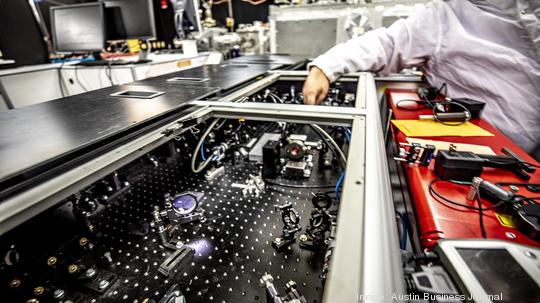
It might sound like Hollywood's way of creating a new weapon for a super villain. But, in reality, the particle accelerator being developed by newly hatched startup TAU Systems could help scientists analyze proteins and biological processes to fight covid and other diseases, as well as reducing the dangers of nuclear waste and developing better batteries and microchips. In other words: This could be big business.
You can think of it as a next generation microscope in many respects. Or, though there are several key differences, you could think of it as a small version of the famous CERN large hadron collider in Switzerland, which consists of 27 kilometers of specialized magnets.
TAU Systems has an ambitious vision that may seem like sci-fi to anyone without a degree in physics. But to founder and CEO Bjorn Manuel Hegelich, developing next generation particle accelerators is almost second nature. Before being lured to the University of Texas by its latest generation laser technologies, he worked at Los Alamos National Laboratory on its particle acceleration team.
"For me, personally, it's been 25 years of research," Hegelich said, reflecting on the path that led him to launch TAU Systems. "Now I'm coming to a point where I'm able to say, 'Okay, we're finally at a point where we can transition this from fundamental research to applications and to commercial industrial applications that we've shown in our labs here.'
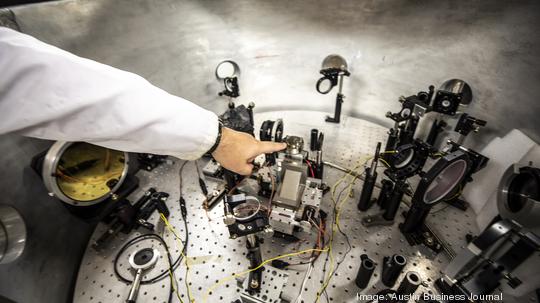
And with that, TAU Systems is spinning out of the University of Texas. It has opened an office on Fifth Street in downtown Austin for its simulations and analysis, while continuing its hands-on laser work at a lab on campus. It expects to begin selling its small-scale particle accelerator, which would be roughly the size of a minivan, within four to five years. Then, it would begin selling them to companies and research outfits for $10 million to $20 million each.
The company is currently in talks with several state economic development groups about locating its commercial installation in 2023.
It will take a lot of additional research to get there.
The startup announced Sept. 26 that it had raised $15 million in seed funding to build out its team and test its prototype.
That financial jump start came by chance when Hegelich bumped into Lukasz Gadowski and began sharing his story about what he was working on. Gadowski, who was an early investor in Volocopter and Archer Aviation, encouraged him to make a business out of it, and he became the company's sole early investor.
Meanwhile, UT holds the patent on the startup's initial advances, while the company is poised to hold the exclusive license to the tech. TAU Systems currently has about 15 employees, along with about seven collaborators at UT and several at Berkeley Labs. The company plans to add around five new employees in coming months.
The company's goal is to have two initial channels of business. One will allow companies to buy one of its accelerators for its own uses. The other would set up accelerators in major cities and rent them out for temporary use by a variety of companies and research organizations or perform analysis for companies and give them the resulting data.
TAU Systems has quickly become one of the most exciting examples of UT's new approach to commercializing technology through the Texas Innovation Center, which takes a startup-in-a-box approach to helping students and professors bring their discoveries to market. The program helps inventors secure intellectual property, find investors and build a path out of the university.
Van N. Truskett, executive director of the Texas Innovation Center, beamed with excitement about TAU System's potential, noting its applications in the medical field, as well as its potential role in semiconductor development and fighting climate change.
"It's not just going to be a unicorn, it's actually going to revolutionize our whole existence," she said.

